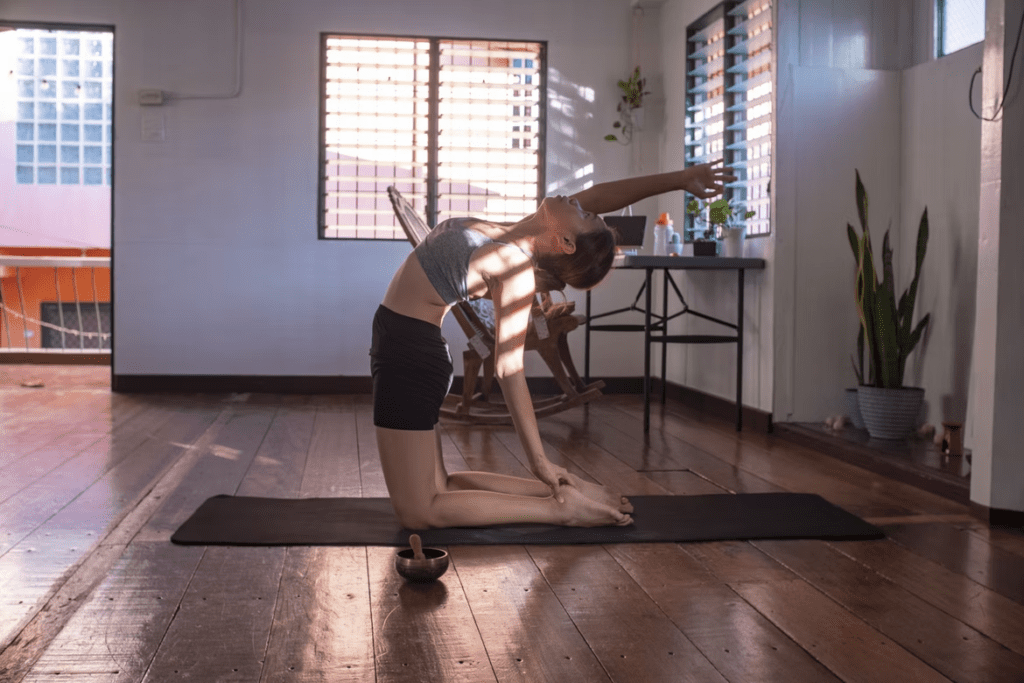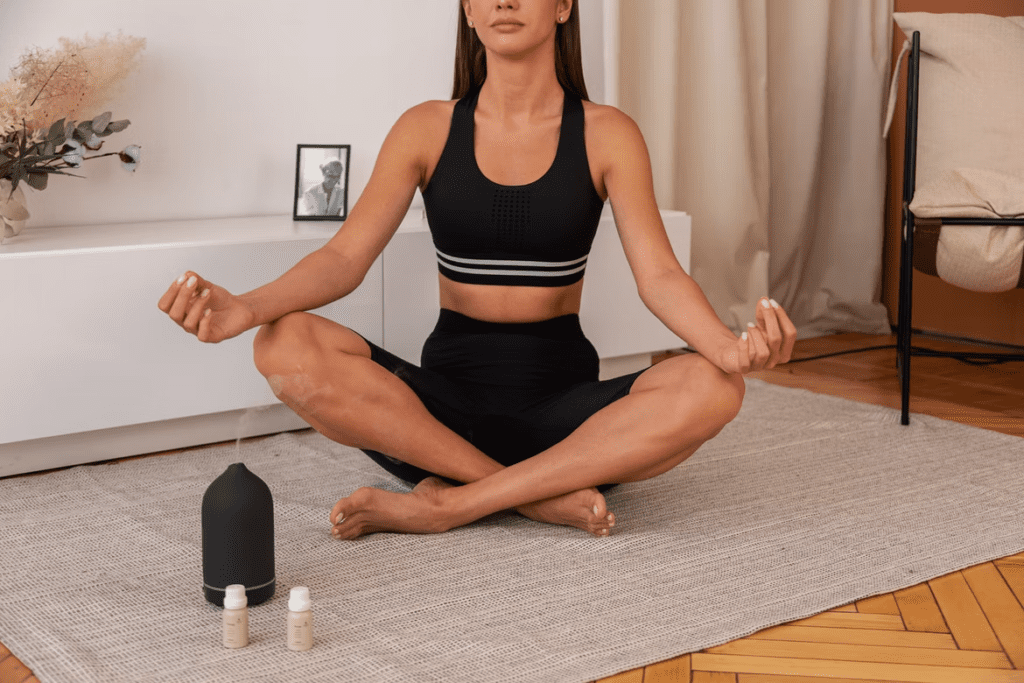Sleep—so basic a necessity, yet so elusive for some.
In today’s fast-paced world, people have to juggle careers and responsibilities with family and social life. With so much pressure to be a “functional human being”, sleep can be hard to come by. Luckily, you can relieve some of this stress with simple exercises for better sleep.
According to the John Hopkins Medical Center for Sleep, exercise can help to stabilise one’s mood and decompress the mind, “a cognitive process that is important for naturally transitioning to sleep,” said Karen Lee, a health and wellness coach at Intellect. You don’t have to exercise like a maniac to get better sleep, but following the right evening workout tips can go a long way.

Can exercising too late in the day interfere with a good night’s rest?
“This is known as exercise-induced insomnia. Exercise does not cause insomnia generally, but if the individual already has insomnia to begin with, the adrenaline and cortisol produced by exercise could be the culprits,” Karen said. “This is why the timing and intensity of the exercise matters.”
But given our busy schedules, many people can only work out after knocking off. Some even prefer it. If you’re one of them, you can benefit from these evening workout tips.
Work out at least two hours before bedtime

There are two reasons for this. One, exercise releases endorphins which can keep some people awake. Exercising two hours before bed ensures that your body and brain have enough time to “wind down”.
Two, exercise raises the body’s core temperature. It’s akin to taking a hot shower in the morning to wake up. When the body’s temperature drops after a couple of hours, it could help facilitate sleepiness.
Of course, “this is dependent on several factors such as the individual’s circadian rhythm, stress-responsive systems, cortisol level, and the like,” Karen said. So it’s better to take this evening workout tip as general advice, but not as a hard and fast rule.
Experiment with aerobics, weights, and stretches

From fast-paced spin classes to restorative yoga stretches, there are tons of exercises out there. But some are better than others at improving sleep. Here are a few:
Cardio
Also known as aerobic exercise, cardio includes any rhythmic activity that raises your heart rate. Studies have shown that regular aerobic exercises for prolonged periods are among the most effective ways to improve sleep quality.
These include running, swimming, and cycling, but those who can’t access their facilities easily can turn to home workouts such as:
- Marching or jogging in place
- Jumping jacks
- Squat jumps
- Lunges
- Mountain climbers
- Burpees
Traditional sleep hygiene does not recommend intensive cardio workouts before bed, but others note that it doesn’t necessarily disrupt sleep. If you want to play it safe, some studies have shown that moderate-intensity aerobic exercises, like walking, can help you doze off more quickly and stay asleep for a longer time.
Strength training
Strength training, also referred to as endurance training, involves exercises that build muscle. These include lifting weights, using resistance bands, and bodyweight exercises like squats and push-ups.
One study found performing strength-based workouts in the morning helped people fall asleep faster in the evening, while strength-based workouts in the evening improved the quality of sleep.
There are plenty of strength training workouts on the internet, but you can try this beginner’s guide by the New York Times. These exercises are accessible because they are all bodyweight activities that you can do from the comfort of your home.
Restorative stretching
Don’t want to break a sweat before hitting the hay? Stretching and meditation can help. Besides improving flexibility and reducing body pains, the combination of gentle movement with breathwork also helps to ease your mind before bed. This is why meditative movements, as prescribed by those in yoga or tai chi, are linked with better sleep and quality of life.
Here are some yoga exercises you can do before bed. You can spend two minutes in each pose:
- Cat/Cow
- Child’s Pose
- Thread the Needle
- Low Lunge
- Bear Huge and Snow Angels
While most exercises can be beneficial, Karen recommends experimenting to see what works and what doesn’t. Even just 20 to 30 minutes can help alleviate stress, get your heart pumping, and raise your body’s core temperature.
“My personal favourites are restorative stretches or moderate aerobic exercises. An evening swim or walk are also suitable,” Karen said. “Avoid the exercises you know will disrupt your sleep.”
Warm down with breathing exercises

“Breathing exercises prove to be a powerful activity that helps with sleep. Slow and deep breathing can increase melatonin and reduce stress and anxiety. Anxious thoughts and rumination activate your mind and sympathetic nervous system, and when left unchecked, can intensify and develop into insomnia,” Karen said.
The 4-7-8 breathing technique, aptly known as “relaxing breath,” is one such exercise. You breathe in for four seconds, hold your breath for seven, and exhale for eight before starting over. Another simple exercise is three-part breathing:
- Take a long, deep inhale.
- Exhale fully while focusing on how the body feels
- After a few rounds, slow down your exhale so it’s twice as long as your inhale
There are many different techniques out there, but what matters is that you’re breathing slowly and deeply while focusing only on the present. That is meditation in its simplest form.
“Some mindfulness tools and apps like headspace and Aura could serve a good purpose if you do not feel like exercising, or your body is feeling fatigued,” Karen said.
Condition your body and mind with routines

There’s something powerful about repetition. When you practise the same habit at a fixed time every night, your brain eventually recognises it to be a precursor to sleep. In other words, an evening routine signals your body to wind down.
“I have a reminder set on my iPhone that by 9:30 p.m., I should start to wind down for bed,” Karen said. “It can be any activity to help you calm your mind and body. Like taking a warm bath, reading, journaling, reflecting on your day’s activities, or meditating.”
How Intellect can help
Consider using Intellect’s self-care app, which provides breathing exercises, mindfulness activities, and journaling. The app includes Rescue Sessions designed to aid in falling asleep and a dedicated Learning Path focusing on sleep hygiene. Moreover, our team of ICF-accredited coaches, licensed counselors, and clinical psychologists is available to assist you in addressing the factors that may be disrupting your sleep.
Learn more about how Intellect can benefit you and your organisation.




